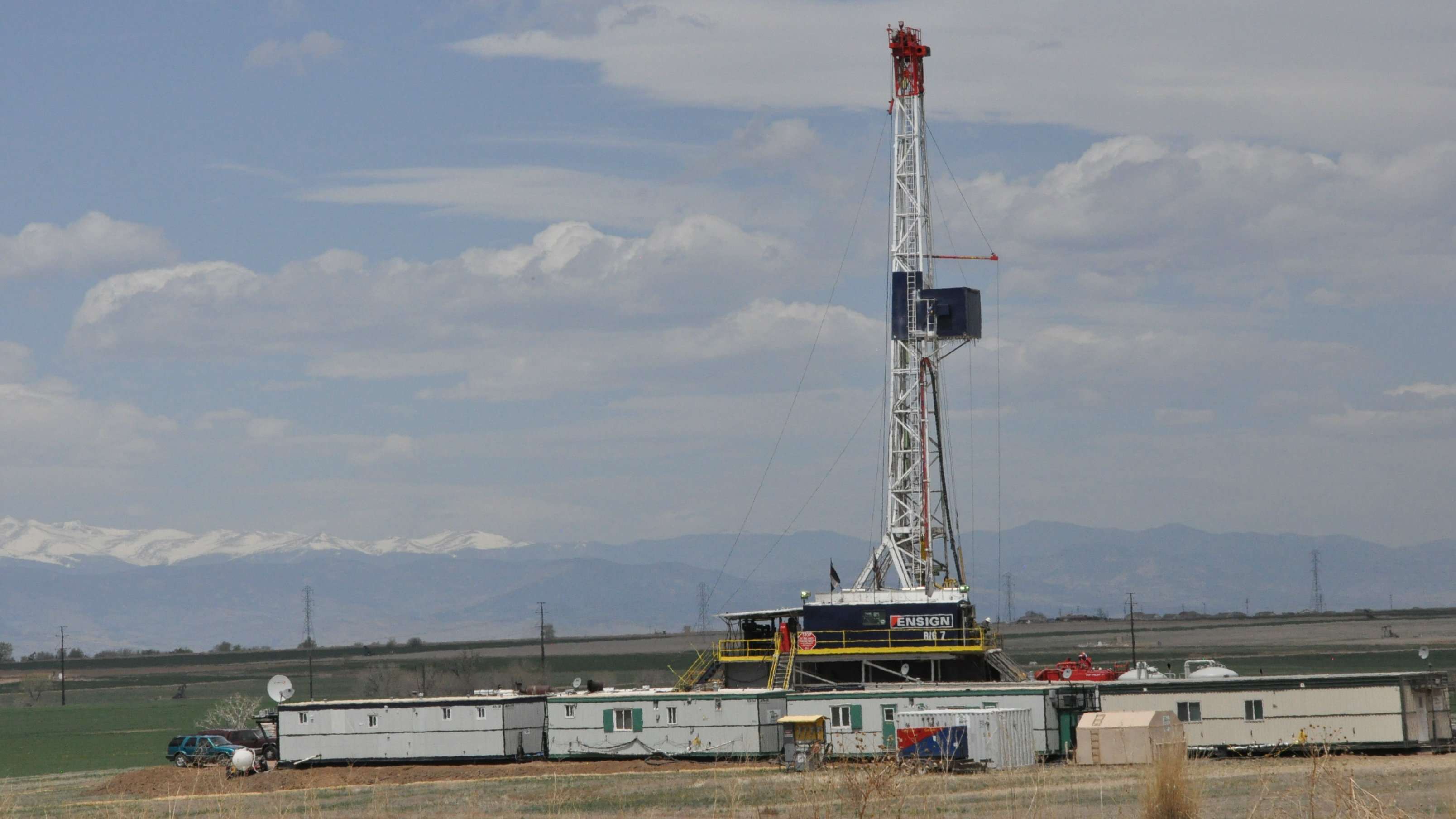
Other installments of CPR's Niobrara Boom series:
- Part 1: Weld County Windfall
- Part 3: A City and an Oil Company Clash
***
Transcript:
REPORTER MEGAN VERLEE: Tracy Cook’s house is ruled by children, from the giant cardboard spaceship in the living room, to the curious baby underfoot in the den.
TRACY COOK: “This is Rebecca over here. She’s seven months, almost eight months. Can you say hi?"
REPORTER: Cook and his wife live on the eastern-most edge of the Denver metro area in a new development with plenty of space for their three kids. Past the end of their Aurora cul-de-sac, vast fields stretch out to the horizon. Until recently, Cook wasn’t thinking about what might be under all that land. But oil companies were.
COOK: "Back in the summer of this year, for a period of about a week or two, all of a sudden, in the grass area that’s between the street and the sidewalk, we started seeing some of these seismic devices."
REPORTER: Those devices came from the oil and gas company Anadarko, which holds the right to any minerals under these homes. Soon Cook’s subdivision was abuzz with speculation about when drilling might be coming, and where, and concerns about traffic, spills, air quality. But when residents took their worries to the city of Aurora, Cook says he was surprised to find local officials had little in place to address oil and gas development.
COOK: "Any other company that did this would have to go through all kinds of permits and processes with the city and be classified as an industrial process."
REPORTER: This is a familiar complaint of residents on the edge of the Niobrara oil play: why is it that cities can zone factories out of residential neighborhoods, but not drill rigs? Commerce City mayor pro-tem Dominick Moreno’s gotten that question from his residents a lot in recent months.
DOMINICK MORENO: "They’ve come to us asking for help and we’ve found that our hands are tied just as much as theirs. At every turn, local governments are preempted by the state. So it’s frustrating from a local official’s standpoint to go back to your constituents and tell them there’s not much you can do."
REPORTER: Commerce City is trying to do something; the city council is working on a range of controls. But when officials first started the process, they got the same response as many other local governments have when they’ve waded into oil and gas regulations: a letter from the Attorney General warning them to back off. State and local officials disagree on how much local control the law actually allows, but the oil and gas industry insists it can’t operate with a patchwork of local rules. Governor John Hickenlooper sided with the industry on that point in his State of the State address earlier this year.
GOV. JOHN HICKENLOOPER: "we intend to work with counties and municipalities to make sure we have appropriate regulation on oil and gas development, but recognize the state can’t have 64 or even more different sets of rules."
REPORTER: Six weeks ago the governor set up a taskforce of Front Range officials, state regulators, and industry representatives to hash out their concerns. In its final report, which comes out today, the task force stressed voluntary solutions. It recommends cities get more involved with the agency that regulates oil and gas wells. And for the first time, it would allow local governments to employ their own well inspectors. Task force member Stan Dempsey heads the Colorado Petroleum Association. He says Colorado doesn’t need new regulations for developing the Niobrara; the existing rules are already the result of years of work between the state and other cities that have experienced drilling.
STAN DEMPSEY: "We have a lot of lessons that have been drawn upon. And so the regulatory scheme seems to work, and though I don’t think anybody wants to have an oil and gas operation in their neighborhood, there are ways to mitigate that."
REPORTER: Geoff Wilson with the Colorado Municipal League agrees. He points out that cities like Greeley and Durango already went through many of the things that places like Aurora and Longmont are wrestling with now.
GEOFF WILSON: "These are jurisdictions getting used to working with this important industry. And as has been the case in the past, with time, and getting to know each other, these local disputes will recede."
REPORTER: But, says Wilson, oil and gas companies also need to be sensitive to the impact of what they’re doing.
WILSON: "For the industry, this is another well. But for the folks the well’s moving in next to, this is something that could affect the biggest investment many of them will ever make in their lives: their homes."
REPORTER: So even though efforts like the governor’s task force may help to improve relationships between local officials and energy companies, it could take a lot more than that to convince worried Front Range residents that a drill rig will ever be anything more than an unwelcome neighbor.
***








